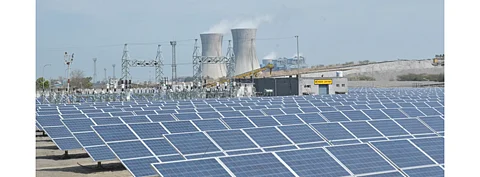

UPNEDA annuls 500 MW solar auction: The Uttar Pradesh New and Renewable Energy Development Agency (UPNEDA) has scrapped its 500 MW solar auction concluded in February 2020 that discovered INR 3.17 per kWh as the lowest winning bid, according to Mercom India Research. Up in arms against the letter issued by UPNEDA to the winners of the auction communicating to them its decision to cancel the results, the National Solar Energy Federation of India (NSEFI) has demanded the intervention of the federal Ministry of New and Renewable Energy (MNRE). It complains that the winners did not receive letters of intent (LOI) from UPNEDA for 16 months after the results were declared, despite assuring the bidders of issuing the LOI within 94 days of the e-reverse auction result.
NSEFI in a letter addressed to MNRE head RK Singh claims the bidders kept regularly following up with UPNEDA. "We strongly believe and would like to submit that these bids are valid and not liable to be cancelled or expired merely because UPNEDA has not fulfilled its part of obligations under the RFP," writes NSEFI Chairman Pranav R Mehta.
The letter goes on to point out that such actions by states to either cancel or renegotiate bids will tarnish the image of India among foreign investors and also make it difficult for companies to execute projects in India.
500 MW solar tender in Maharashtra: The Maharashtra State Electricity Distribution Co., Ltd. (MSEDCL) has launched a tender for 500 MW AC solar power capacity to be set up in the state as decentralized projects under component A of the Pradhan Mantri Kisan Urja Suraksha Evam Utthan Mahahiyan (PM-KUSUM) Scheme. It will procure power from projects with a minimum capacity of 500 kW to a maximum of 2 MW. Power generated will be procured by MSEDCL under a 25-year PPA with the winners. Projects need to be installed primarily on barren/uncultivable land. These can also come up on agricultural land provided installed in stilt fashion with adequate spacing between panel rows to ensure farming activities are not affected. Farmers will be able to generate revenue by leasing their land for solar power generation. MSEDCL has capped tariffs at INR 3.05 per kWh as per the tender documents on its website that mention the last date to submit bids as June 28, 2021.
NTPC LOA for 210 MW solar capacity: The National Thermal Power Corporation (NTPC) has issued a letter of award (LOA) to Tata Power Solar to build 210 MW solar PV capacity worth INR 6.86 billion ($94 million). Tata Power Solar will undertake EPC works for the solar projects including procuring land in Gujarat. It plans to complete and commission the capacity by November 2022. With this addition, its total order pipeline has gone up to around 2.8 GW worth INR 130 billion ($1.78 million). This LOA follows another one the company secured from NTPC for a 320 MW ground mounted solar project in January 2021 (see India PV News Snippets: Tata, AGEL, Kawatha, Budget).
HDFC Bank aims for carbon neutrality: One of the largest private sector banks in India, HDFC Bank has pledged to become carbon neutral by FY 2031-32 which would lead to it expanding its renewable energy generation capacity to lower emissions. As part of the bank's ESG strategy, it will increase rooftop solar capacity for large offices and convert 50% of its total sourced electricity to renewable energy, among other initiatives.
